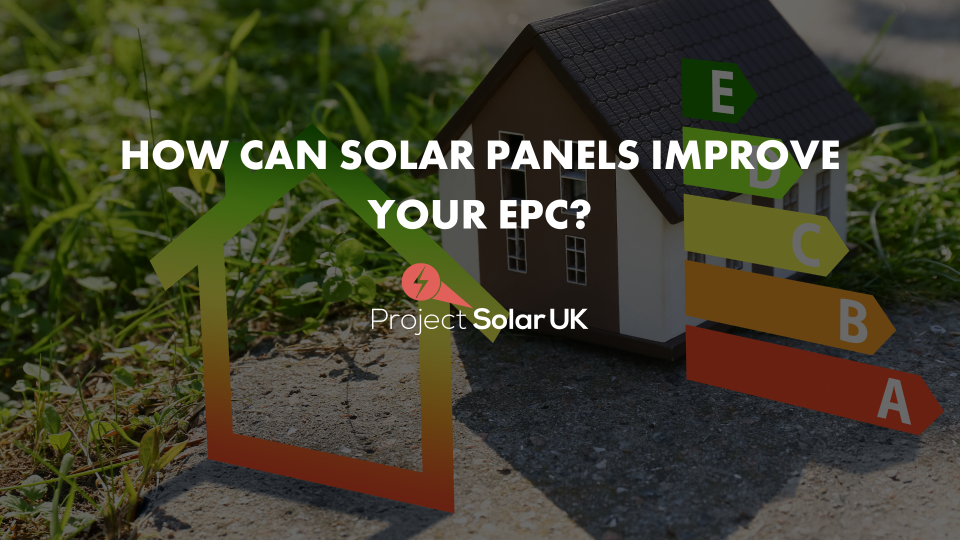Solar panels have the potential to transform residential energy use, both for the short and long term. Once they’re activated, solar panels supplement grid-generated electricity with green power.They’re also an excellent way to improve your home’s Energy Performance Certificate (EPC) rating, a crucial measure of a building’s energy efficiency and environmental impact.The relationship between solar panel installation and EPC ratings is intrinsic to property value, energy costs and environmental awareness.
What is an EPC rating?
An Energy Performance Certificate (EPC) is a document that rates a property’s energy efficiency, ranging from A (most efficient) to G (least efficient).If a property is being sold, rented out or built, it must have a valid EPC certificate before tenants are allowed to move in.The EPC offers insights into a property’s energy use, and according to UK government guidelines, it should also provide recommendations for how property inhabitants can save money and reduce their energy consumption.Potential buyers or tenants can use an EPC rating to estimate the energy costs of a property before making a decision.
How is your home’s EPC score calculated?
The score of the EPC certificate is the Standard Assessment Procedure (SAP) score, which is designed to evaluate a building’s energy performance.To determine the SAP score, assessors examine a property’s energy consumption per square metre, potential energy loss (e.g., through poor insulation), heating system efficiency, insulation quality, the energy source used for heating, and the presence of any renewable energy technologies.This detailed analysis results in a SAP score ranging from 1 to 100, where a higher score indicates better energy efficiency.
What factors affect your EPC ratings?
Several factors can affect your EPC rating, including:
- Ventilation
- The size and layout of the property
- Heating systems
- Lighting
- Solar panels / renewable technologies
Why is a good EPC rating important?
Increased property value
Upgrading from a lower EPC rating to a higher one can significantly increase a property’s value. For instance, moving from a D to a C rating could add 3% to the property’s value, which, according to an analysis conducted by property consultants Knight Frank, translates to an average uplift of £9,003.This increase becomes even more pronounced with greater jumps in EPC ratings and demonstrates a clear financial benefit to improving your home’s energy efficiency.
Reduced energy bills
A higher EPC rating indicates more efficient energy use and, as a result, lower running costs.Properties with higher ratings typically utilise less energy for heating, hot water, and lighting, which can translate to considerable savings on energy bills over time.
Comfort
Enhancing a property’s EPC rating often involves improvements like better insulation, efficient heating systems, and drought-proofing, which all contribute to a more comfortable living environment.
Environmental benefits
Improving energy efficiency through a better EPC rating can have a direct environmental impact. Energy-efficient homes use less fossil fuel-based energy, meaning they also produce lower levels of carbon dioxide.
Can solar energy systems improve your EPC Rating?
Yes, solar energy systems can improve your EPC (Energy Performance Certificate) rating!Solar panels reduce a household’s dependency on fossil fuels by supplementing some of your grid-generated supply with green energy.A well-installed solar system could potentially move your property into a higher efficiency band (how many points you could move up depends on the size and energy efficiency of your solar panels).Using solar panels to improve your EPC rating not only has environmental benefits, but financial ones, too. Properties with higher EPC ratings tend to have higher market values and are more appealing to potential buyers or tenants who are eco-conscious.
How to Get an EPC Rating A
Install solar panels
As an EPC rating reflects the reduced energy costs and enhanced sustainability of a property, installing solar panels can raise your rating significantly. By generating renewable energy directly from sunlight, solar panels reduce reliance on non-renewable energy sources and lower your home’s carbon emissions.
Upgrade your insulation
Proper insulation is crucial for preventing heat loss. Upgrading loft insulation, cavity wall insulation, and floor insulation can significantly improve your home’s thermal efficiency.For example, insulating your loft to the recommended depth and filling cavity walls could save you hundreds per year in energy bills, besides improving your EPC rating.
Enhance your heating systems
Replacing old and inefficient boilers with new condensing boilers, along with installing modern heating controls, can lead to substantial energy savings and improve your EPC rating.According to the Energy Savings Trust, heating controls alone can save you around £130 annually, with more substantial savings and improvements to your rating achievable through a boiler upgrade.
Improve your windows
Replacing single-glazed windows with double or triple-glazing can prevent heat loss, reduce energy bills, and contribute to a higher EPC rating.Double glazing is particularly effective in older properties that currently have single glazing: they’ll better insulate your property and have greater soundproofing properties.
Improve your EPC rating with Project Solar!
Moving into a higher EPC band can have numerous advantages for property owners. With more efficient energy use comes lower bills, and with reduced energy consumption comes a more eco-friendly way of living.You can take this one step further by investing in solar panels! Not only are they an excellent way to improve your home’s EPC rating, but they’re invaluable to the UK’s net-zero 2050 emissions target.By partnering with Project Solar, we can improve the number of residential and commercial PV installations and make this country a greener place. Contact us today to learn more about our products!



